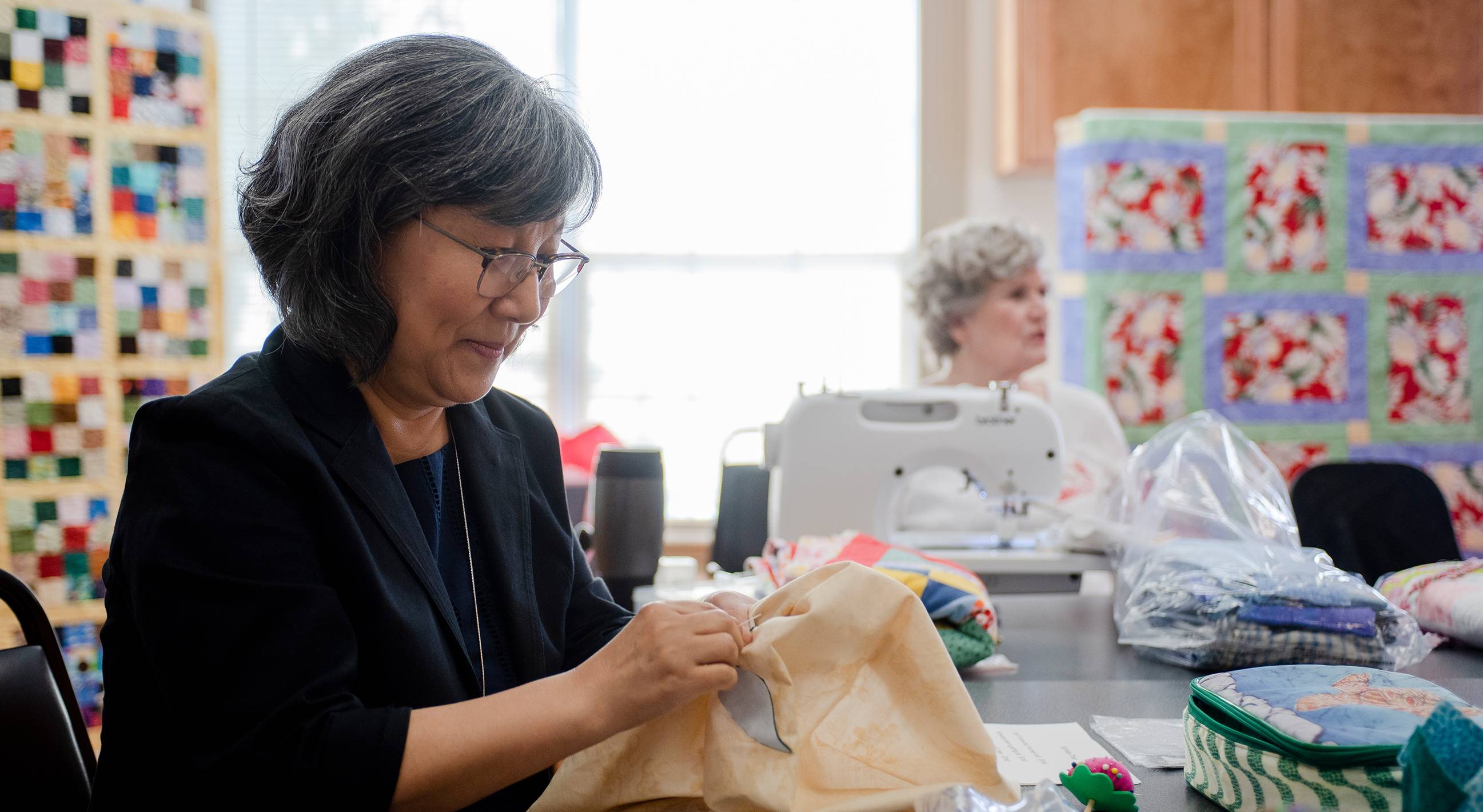Dr. Kyong Hee Chee studies aging in communities

Dr. Kyong Hee Chee studies aging in communities
Dr. Kyong Hee Chee’s research interests include aging and the life course and community development. A faculty member of the Department of Sociology, her current research projects concern cognition, generativity, and intergenerational exercise programs. She is a fellow of the Gerontological Society of America and has taught undergraduate and graduate-level courses at Texas State University since 2006. In 2014, she joined Bee Friends, a community of quilters who range in age from mid-50s to the 90s. They meet regularly at the Price Center, an intergenerational community center in San Marcos.
Q: HOW DID YOU BECOME INTERESTED IN RESEARCH ON AGING AND COMMUNITY?
A: “I was a graduate research assistant at Iowa State University, working on an interdisciplinary applied research project about communities called the Rural Development Initiative. While helping out in data collection, I found out that — among those who participated in the survey — older residents tended to respond fastest and with greater interest.
“I was touched by how deeply the oldest residents cared about their communities. Why do older residents care so much about the future of their communities? Are they thinking about younger people who will live on?”
Q: WHAT WOULD YOU LIKE PEOPLE TO KNOW ABOUT YOUR RESEARCH?
A: “The importance of social ties. I like to focus on so-called ‘weak ties,’ although we often think about social relationships with family and friends. We value close ties, which are known to affect health outcomes, and we know less about the benefits of weak ties. Weak ties can be formal relationships such as a membership in a local organization or relationships with acquaintances.
“I would like to emphasize the power of weak ties. Among retirees in Iowa, for example, local social ties and local group memberships were significant factors for predicting community participation. I found that the level of education or home ownership were not as strongly associated with community participation. Also, social interactions within a diverse network seem to help protect cognitive function according to my co-authored article on Chinese older adults.
“One of the projects I am currently working on involves creative group storytelling with people living with dementia. We are looking for ‘generativity’ [defined as ‘the human experience of contributing to and promoting lives of others and oneself’ as per my co-authored publication].
“The stories created by people who have memory losses, cognitive declines, reflect the values of generativity. Yet, people living with dementia do not have as many opportunities as they could to contribute to the community.”
Q: HOW HAS YOUR RESEARCH IMPACTED YOUR TEACHING?
A: “With my specialized knowledge in aging and the life course, I can help students realize how important it is to learn about aging and the life course. I can make it real for them.
“My enthusiasm and passion for the field of aging comes up more naturally, I guess. I have a lot of research findings to share with them, not just from my own projects but I can give more examples for different theories, theoretical concepts, and methodologies used in aging research.
“Knowing the ageist bias of people and the stigma of dementia, I try to reduce (the students’) ageism and various forms of prejudice, debunking the myths associated with aging and memory-related changes.”
Q: YOUR HOBBY – QUILTING – IS DEFINITELY AN OLD-FASHIONED PASTIME. WHAT DO YOU LIKE ABOUT IT?
A: “I always liked fabrics as a medium. I was an art major as an undergraduate and wanted to try fabric art, although I did ceramics. Like any other crafts including ceramics, quilting is not just for aesthetic value, it’s about usability.
“After my grandmother passed away, I happened to see this bundle with different pieces of fabric that she left behind. Her sewing skills were superb. I remember being impressed by some small, fancy fabrics she pieced together. I enjoy using scraps that otherwise would be thrown out — trying to turn them into something nice.
“Another reason I like quilting is that I am with a wonderful community of amazing quilters! I have learned so much from members of Bee Friends. They are so smart; one has to be, to be a good quilter. They are so creative, disciplined, diligent, and resilient.” ✪